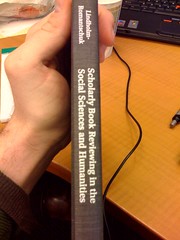Resource Profile: Scholarly Books

Photo by rhousewright at Flickr
How can you tell if a book is scholarly? The best way to tell is to look at who publishes it. If it's published by a university press or by several other academic presses (e.g., Blackwell, Routledge, Palgrave, Ashgate) it is scholarly. There are other presses that publish scholarly books as well, depending on the discipline. Another way to decide is to look at the book's intended audience and purpose.
How are scholarly books different from regular books? Scholarly books are published regardless of whether or not they will make money. In fact, most scholarly books actually loose a lot of money. Instead, scholarly books exist to contribute to knowledge, and they support the research of academics and scholars at all levels. All other books at least have an ostensible goal of making money.
Who decides whether or not a scholarly book gets published? Editors at scholarly publishers express initial interest in a book, but they don't make the final decision. All scholarly books go through an extensive process in which experts in the field read the manuscripts and decide if the book is worthy to be published. In other words, scholarly books are peer reviewed sources.
What are the features of scholarly books?
- Often directed toward a narrow audience that has specific reseasrch interests.
- Always have information cited in text or in footnotes.
- Provide extensive bibliographies and overviews of existing research.
Finding Books with Library of Congress Subject Headings
Once you find a book in the catalogue that you know will help you with your research, you should try to find other books with the same Library of Congress subject headings. What does this mean? Watch the video below.
Click on the lower right-hand corner of the video player to view in full-screen format.
World Cat as a Global Search Tool
WorldCat is the largest network of library resources worldwide. In searching the WorldCat catalogue, you are finding information about the holdings of almost every library in the United States.
Google Books
Google Books is a great supplementary resource to discover books that pertain to your research. Since the Google Books digitization project began several years ago, Google has made electronic copies of 12 percent of the world's books that have ever been printed. With this incredible repository, you can access the full text of many books that are out of print or unavailable. You can also read sections of chapters online and immediately decide whether the book you've found will be useful.
Use the field below to search the Google Books library.
Information Literacy Poll
If you are looking for a book about religion and cultue, what are some of the factors you keep in mind as you decide whether or not you should use a book in an academic setting?
Interlibrary Loan
Interlibrary Loan, or ILL, is a service Carmichael Library provides whereby students and faculty can borrow books or get copies of journal articles that we don't have from another library. This service is free!
In order to use Interlibrary Loan, you'll need to create a free account on ILIAD, the library's lending service.
Also, within many of the databases you can select "Find Full Text"; if the book or article is not available in the library you can borrow it from another library without leaving the database.
How to Read Call Numbers
The Carmichael Library uses the Library of Congress classification system to catalogue books. Below is a list of guides to interpreting the call numbers and finding books on the shelf.


